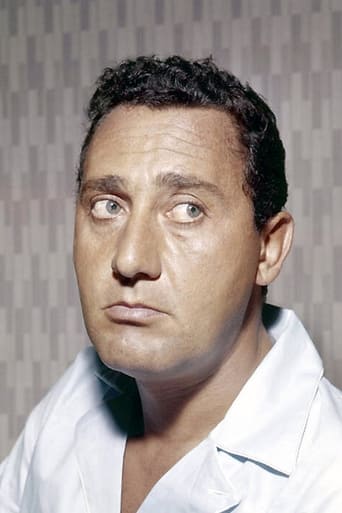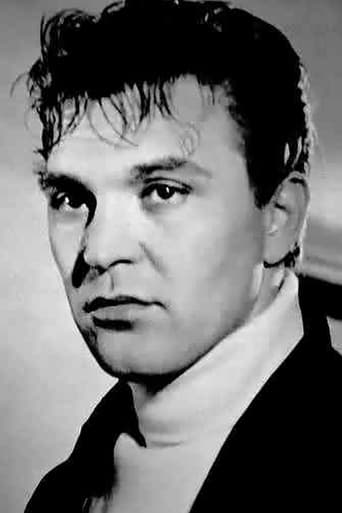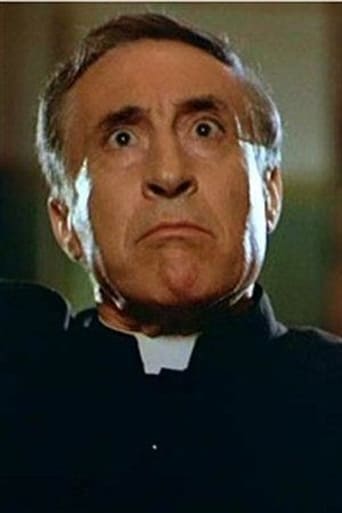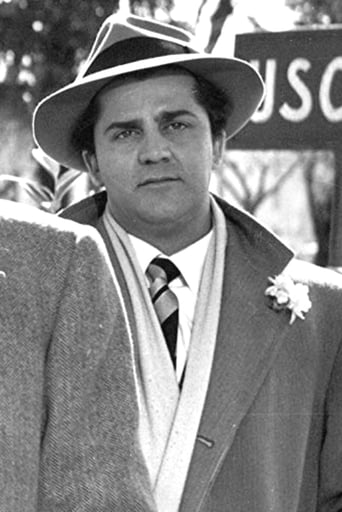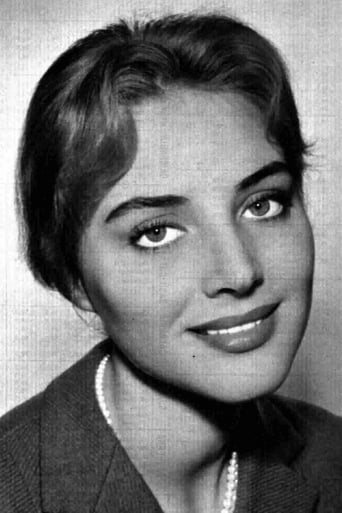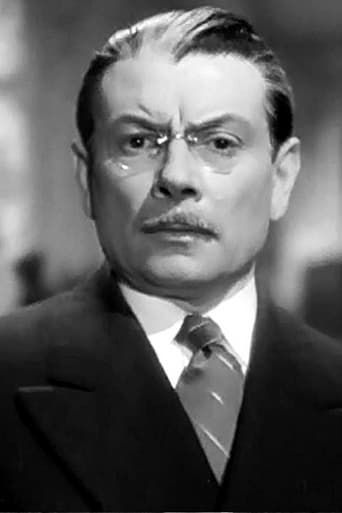Evengyny
Thanks for the memories!
Teringer
An Exercise In Nonsense
AutCuddly
Great movie! If you want to be entertained and have a few good laughs, see this movie. The music is also very good,
Keeley Coleman
The thing I enjoyed most about the film is the fact that it doesn't shy away from being a super-sized-cliche;
PassPopcorn
I Vitelloni is one of the lesser known movies by the world famous Italian filmmaker Federico Fellini. And even though it's not well-known, apparently it is Stanley Kubrick's favourite movie of all time, and is also praised by Martin Scorsese and George Lucas. Also, in my opinion, it should definitely be seen by movie- and Fellini-lovers alike, along with the famed 8 1/2 and La Dolce Vita – and especially if you're not very fond of Fellini's excursus in pure comedy, like in Lo Sceicco Bianco. I Vitelloni is a classic Fellini drama: there are a few good laughs, but melancholia is a constant and the ending is not exactly a happy one.I Vitelloni follows five friends – Moraldo (Franco Interlenghi), Alberto (Alberto Sordi), Fausto (Franco Fabrizi), Leopoldo (Leopoldo Trieste) and Riccardo (Riccardo Fellini) – who are in their thirties but haven't done anything with their lives and don't even have jobs, so they spend their days and nights fooling around and wasting time. When Fausto is forced to marry Sandra (Leonora Ruffo), because he impregnated her, the others – and especially Alberto – start questioning their existence and their future, while going on with their everyday lives: Leopoldo tries to write a good play, Alberto gets drunk and depressed, Fausto cheats on his wife and Moraldo, the quiet one, observes and narrates the story for the audience."Vitelloni" is a term that was used among young people living in Pescara – the city where Ennio Flaiano, one of the screenwriters, was born – to indicate other young people who spent their days doing nothing, mostly because it was very difficult to find a job in the post-WWII period (which is when the movie is set, too). It was also a very risky investment: Fellini's previous film, The While Sheik, had flopped, and he decided to cast Alberto Sordi, whom the audience didn't like. Still, the movie was well received and won some important Italian prizes, and it was Fellini's first movie with international distribution. All of this, I think, was well deserved. I Vitelloni focuses mainly on atmosphere: it starts happily, at the end of the summer. However, the main characters soon start complaining, because there's nothing to do in their small town during the winter, and their negativity projects outside, on Fausto, who is forced into a marriage he doesn't want. Also, everyone talks and thinks about leaving, but nobody does.The thematic and the atmosphere give a constant feeling of melancholia, and every fun activity of the vitelloni is interrupted by something bad: for example, Alberto chases a dog on the beach and discovers that his sister is seeing someone he doesn't like, again. All the actors are very good and likable in their roles, but I think Sordi really stands out, as he manages to portray a seemingly carefree man who acts like a fool most of the time, but is actually very sensitive and troubled. It is also great seeing the contrast between the young and the old: the vitelloni don't want to become serious adults, because all the adults in the movie are negative and lead boring lives. Ultimately, the vitelloni find it hard to abandon the gang, after so much time they've spent together. All in all, this is a great movie about serious growing up that will make you remember the days of youth and untroubled fun, and while nostalgic, you'll also clearly realise why it's so important to, eventually, leave all of that behind.Rating: 8/10 Read more at http://passpopcorn.com/
Tim Kidner
There seems to be many 'literal' translations for I Viletoni. The Young (Fatted) Calves a popular one, meaning spoilt young men. For me, though, their swooning and parading, showing off and dis-regard for authority and discipline veers me to that other show-off: the buck.What struck me immediately was the sumptuous photography, set design and even then, Fellini's night-time street scenes are full of lighted magic and intrigue. Only in these sorts of Italian films do you want to step out into the night and join these characters - most other directors portray their nocturnal going-ons as seedy, no-go, dangerous places.The four central characters are exsquitedly well groomed, especially Fausto, the womaniser. For unemployed layabouts (Fausto briefly found work in a religious curio shop) he is one sharp dude, who looked to me strikingly like Richard Burton - and indeed, Sandra, his long suffering wife, as Elizabeth Taylor. I couldn't help comparing the domesticity to the British kitchen sink dramas of the '60s, or even the odd early Bergman. I also felt some of Preston Sturge's influences may have been bestowed on Mr Fellini. I totally see where Marty Scorsese gets his influence from, especially in his Mean Streets. You can almost tick off which character would be which, but being the great man he is, naturally updated it, transferred it and made those night-times daring and dangerous. The scene where they all go by train out into the country and argue as to which bird is in song, reminded me of a similar one in Trainspotting. Of course, the despairing arguments in that one are of a rather more spurious and coarse nature! The Carnival scene is superbly exuberant, full of 'colour' and pizazz. You can almost hear the buzz and crackle and laughter. When Fausto helps his drunk friend home, much to the annoyance of Sandra recalled another Italian tradition - the love of your 'brother' (or friend) over that of any woman, whether she be wife or not. That spills over and continues with Scorsese to this day. The ending too, has the emerging hallmarks of Fellini - thought provoking, complentative, still. But, for me, this isn't Fellini's greatest. More concise and focused than the (often) rambling La Dolce Vita, but where I prefer Scorsese's Taxi Driver over Mean Streets, I yearn for more of a story and unfolding narrative than pure character study, however well done. I enjoy Fellini's allegorical ding-bats and his opening up of the hypocrisies of religious tradition. You don't get those in I Vitelloni.Sharply observed and styled, definitely; ultimately satisfying? Not totally.
Rindiana
Fellini's first masterpiece may not be as well-known as later classics, but it's just as wonderful, fortunately lacking the maestro's later (sometimes overbearing) tendencies to turn to caricature and the grotesque.The director's humanity and the resulting poetic images in beautiful black-and-white photography enrich a basically neo-realist plot and turn it into something magical. We not only care for these five young men, we become them, parts of them, at least.This is deeply emotive film-making.9 out of 10 sad days at the seaside
jotix100
It came as a total surprise finding this film on a cable channel recently. Not having seen it in quite a while, we decided to watch it again. ¨I vitelloni¨ is one of Fellini's classics that one can see from time to time and still find new things in it. This was Federico Fellini's third work as a director, although his connection with the Italian cinema went way back, because let's not forget he had a glorious career as a screen writer for the likes of Roberto Rosellini, Pietro Germi and Alberto Lattuada, among others.The reigning style of that era was the neorealism, which is reflected in the way Fellini dealt with the central story. That movement liberated movie directors from filming in a studio, as most of their films were shot on actual locations. Italy at the time was going through a terrible time after their defeat in WWII. Unemployment was rampant, something that is easy to understand in the way ¨I vitelloni¨ got involved in bringing out the problems .We are taken to a small town where a group of five young men try to while away their time since no jobs are available to them. There is Fausto, the handsome man who has impregnated his girlfriend and is bound by honor to marry Sandra. Leopoldo, an aspiring playwright lives in a fantasy world, having fallen in love with the maid from the house next door. Alberto, relies on his sister Giulia, who works in the local newspaper, for pocket money. Finally, Riccardo, appears to be the most grounded member of the gang, goes along for the fun they have being together. Moraldo, who becomes Fausto's brother-in-law, acts as the conscience of these aimless men; he is the only one that has the courage to leave the small town.Fellini collaborated in this film with Tulio Pinelli, a genius in his own right, and Ennio Flaiano, to create a story that was relevant as it depicted the times their country was living. Fellini was blessed in that he worked at the time when he could rely on someone of the caliber of Nino Rota to work on the musical score that serves his picture in unexpected ways. The cinematography was shared by three of Italy's leading cameramen, Carlo Carlini, Otello Martelli and Luciano Trasatti; they captured the town just as probably Fellini wanted it to look.The acting is dominated by Franco Fabrizi who plays Fausto. With his good looks, it's easy to see him as the vain man who wanted to satisfy his desires in whatever way he can. Leopoldo Trieste makes an impression with his 'Poldo, a pathetic figure living with his head in the clouds. Alberto Sordi, who had worked with Fellini in ¨The White Sheik¨, has a small part as Alberto. His scene at the carnival ball when he dresses up as a woman, goes from funny to tragic as he runs into his sister who has decided to run away with her lover. Franco Interlenghi makes the most out of his Moraldo.¨I vitelloni¨ is highly recommended to all fans of the Italian cinema golden years, and specially to Federico Fellini's admirers who will not be disappointed with this minor masterpiece.


